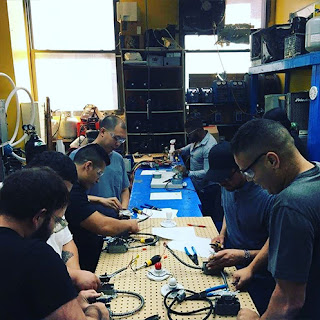Learn All Modules of the HVAC EPA Certification and Advance Your Career!
When working with potentially hazardous substances, getting certified is essential. The HVAC industry considers HVAC EPA certification nearly mandatory to protect the environment and prevent potentially dangerous situations. You need an expert's perspective and handling of equipment to successfully market your services related to refrigeration and air conditioning systems.
A technician with this certification has demonstrated advanced mastery of the substance. The environmental protection agency (EPA) regulates and controls all the machinery you work on and the materials you handle, so becoming certified by the EPA can be the best thing you do to boost your career.
In this blog, we describe key portions of the exam
that cover a wide range of subjects, including but not limited to ozone depletion, the value & risks of refrigerants, safe practices, and the three R’s- recover, recycle, reclaim, etc.
You'll need to pass a series of tests given by a certifying body recognized by the EPA and tailored to the particular piece of machinery you'll be servicing. You'll need to pass four tests to earn your HVAC EPA certification: Type 1, Type 2, Type 3, and Universal.
Let us take a look!
Type 1:
Type 1 HVAC EPA certification is available online in an open-book format and allows you to service small appliances. These small appliances usually weigh five pounds or less and use factory-sealed refrigerants. This section will teach you proper recovery techniques to deal with small appliances.
To pass this section, you must gain in-depth knowledge of the safety and recovery of refrigerants in small appliances and other residential appliances.
Type 2:
If you want to provide service for high or very high-pressure machines except for small appliances or air conditioners within motor vehicles, then you need to be certified in type 2 section certification. After EPA 608 certification test preparation, you are expected to learn about leak detection and proper testing equipment.
Once you acquire type 2 section certification, you will be an expert in safely disposing of high-pressure appliances with refrigerants, residential air conditioners, commercial equipment, heat pumps, and grocery stores' refrigeration systems.
Type 3:
This certification requires proper servicing and disposal of low-pressure appliances and allows you to focus on obtaining leak detection, fixes, disposal of refrigerants, safety, and recovery techniques. Leak detection is a vital component of low-pressure HVAC services. In addition, you need to have comprehensive knowledge about nitrogen that is used in low-pressure appliances.
Universal certification-
If you wish to work as an HVAC technician with all types of appliances and air conditioning systems, you must be universally certified. You can obtain a universal certification with all of the required skills if you complete and pass all three certification exams. A globally certified technician is capable of disposing of any refrigerant-containing appliance.
Therefore, preparing adequately for an HVAC EPA certification exam is crucial as each section needs a minimum passing grade of 72% per section or 84% in the open-book format. If you already have some knowledge and expertise in the HVAC field, acquiring the certification may be the best and quickest way to advance your career and develop a profitable business.
If you feel you are ready to take the exam, then The Refrigeration Institute is the place to enroll. If you want to get your HVAC EPA certification quickly, come to us because we have a stellar track record of placing our students in rewarding careers.
So call us at 1-212-244-2588 and schedule a consultation with an expert to learn more about our enrollment process today!


Comments
Post a Comment